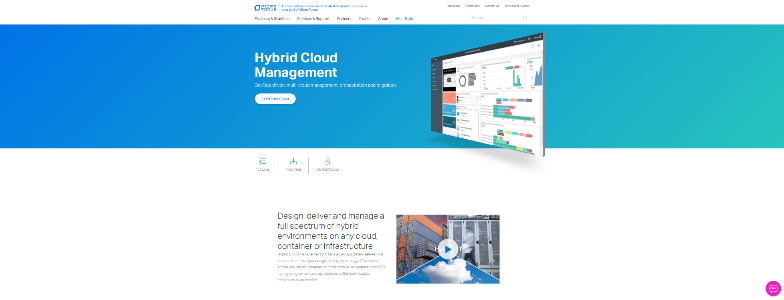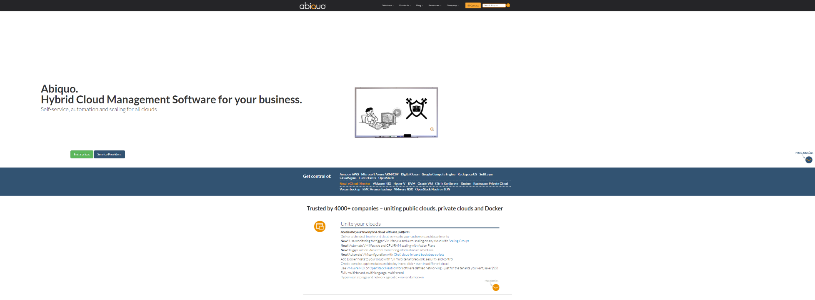Top 10 Best Hybrid Cloud Management Software Providers
If you have considering hybrid cloud storage of your digital works, you should know that only a few of the companies that are migrating to the cloud have required strategy needed to transfer applications and information according to the recent study. So in order to avoid spending more money or facing difficulty while moving workload to the hybrid cloud selected, read through this these tips:
Read More: Top 30 Best Enterprise Automation Cloud Tools List for Infrastructure Automation
The reason for your migration: In the first instance it is important for you to have reasons why you want to transfer data to the cloud. So, before changing present cloud or moving data to the cloud it is important for the business to have good reasons. Also, a company needs to have obvious points, as well as concrete metrics for their needs and the easier way make the success. As a good CIO, you need to only take a well-calculated risk to ensure the progression of the organization. You also need to understand that moving to the cloud is not just all about transferring information and applications to another server but in the real sense a demonstration of business improvement.
Check the Hybrid Cloud Service Provider: Hybrid Cloud is simply the collection of computing, storage and network infrastructure closely supervised via APIs. So, it is important for you to be sure that the cloud service provider offers valuable APIs for both elastic solution and cost effectiveness. Organizations need centrally integrated, managed and well secure environments coupled with obviously stated SLAs on security, performance as well as availability.
Analyze cloud impact: It is normal that the applications are interlinked with other applications and systems. So, make sure you take note of the end result of cloud migration before going ahead to do so. Ensure you review your workload properly through which you can know the applications that required an update before and even during the cloud execution.
Do the Standard test requirement: There are security measures, workload profiles, elasticity, performance, bandwidth, transition, availability requirements and technology capacity for all applications. So, you need to develop cloud pilot that will show you the workload that should be transferred to the Hybrid cloud.
First move before renovating: There is a need for a critical test for thorough planning before moving. The hybrid cloud users have the ability to control economies of scale associated with the cloud, minimize capital spending and also shorten the time by selecting cloud like an app design centre rather than redesigning applications that are present. That made it needful to refine and also improve applications in the cloud after required constituents have been developed.
Consider security: Due to the need for security when it comes to moving to the cloud, it is important to consider industrial standard. Make sure you know the possible security pitfall by testing security with third party sources like Cloud Security Alliance Consensus Assessments Initiative Questionnaire. Adding to this, you are to go for storage services in the hybrid cloud with a well-certified standard like the FIPS-140 and others.
Chomp the numbers to know the cost: One of the key reasons to move to the hybrid cloud is to save cost. So having an obvious sense of entire cost involved will make SaaS assessment easy and bring about easy host solution.
Make sure your management console is well secured: The life of your data center solidly depends on the cloud computing That is why management consoles need proper security at all cost. This is to avoid it being hacked for the reason of ransom just like what happened to Code Spaces with the hackers forcing them to close down by deleting their data on the hybrid cloud for refusal to pay a ransom.
Read More: Top 10 Hybrid Cloud Providers
Top 10 Best Hybrid Cloud Management Software Providers:
MICROFOCUS
Micro Focus Helion Cloud Suite, hybrid cloud management software, delivers and manages traditional and open source environments for existing & cloud native applications.

MICROFOCUS
SCALR
Empower IT teams with autonomy and operational flexibility while maintaining corporate compliance with the Scalr Cloud Management Platform.

SCALR
ABIQUO
Hybrid Cloud Management is at the heart of Abiquo’s Cloud Solution. Build your Cloud Service with Abiquo and create a fully managed cloud for your users.

ABIQUO
INCONTINUUM
CloudController is a Hybrid Cloud Management Platform, it unifies on-premise & public Cloud resources. Main hypervisors, IBM SoftLayer, Microsoft Azure, AWS.

INCONTINUUM
RIGHTSCALE
Get RightScale Cloud Management to save money and streamline operations across any cloud, any server, and any container.

RIGHTSCALE
IBM
IBM solutions for hybrid cloud management provide you with a consistent way to monitor, manage and optimize workloads across your multi-cloud environment—powered by Watson.

IBM
CLOUDBOLT
CloudBolt’s hybrid cloud management platform enables enterprise IT departments to efficiently build, deploy, and manage private and public clouds.

CLOUDBOLT
ONAPP
OnApp is a complete cloud management platform for service providers and enterprises. Public, private and hybrid cloud, containers, storage, CDN, DR and more.

ONAPP
TURBONOMIC
Workload Automation that enables your cloud & on-premises to self-manage in real-time. Assure Performance. Lower Costs. Ensure Compliance.

TURBONOMIC
SNP
SNP’s solutions for hybrid cloud management provide you with a consistent way to monitor, manage and optimize workloads across your multi-cloud environment through automation and cognitive insights.

SNP
Imagine a company wants to treat your data for financial transactions or other information which it considers very sensitive internally. She will prefer to mount a private cloud. As for the data that are not so sensitive, you can perfectly work in a public storage service. This decision may rise to a hybrid cloud.
Hybrid cloud models can be implemented in numerous ways. The three most common are:
- Separating cloud providers to provide both private and public services as an integrated service;
- Individual cloud providers offering a full hybrid package;
- Organizations that manage their private cloud hiring a public cloud service, which then integrate into your infrastructure;
- The Hybrid Cloud as a technological trend;
Now that you know what is Hybrid cloud, you know that it is also a great choice for companies that already have an internal infrastructure and who wish to enjoy the benefits of cloud computing as cost reduction, scalability, information security and flexibility.
Read More: Top 10 Hybrid Cloud Integration Services
Benefits include:
Facilitate connectivity.
In addition to managing files, companies must incorporate various business processes such as internal messaging, scheduling, business intelligence and analysis, and other CRM systems.
Public cloud offers by itself does not facilitate the integration of hardware on site. Devices such as printers, scanners, fax machines and physical security devices such as security cameras, fire sensors and others, can not be interesting for adoption of public cloud. Instead of isolating these mission-critical devices from the rest of the organization’s network, using a private cloud component solves the problem.
Reduce complexity and facilitate IT management
With the hybrid cloud model, IT decision-makers have more control over both components than using a platform prepackaged public cloud, especially for enterprise content management. Solutions Software-as-a-service (SaaS) face frequent refurbishments and editions without notice or consent and, if poorly written, can break compatibility with existing content.
Leverage public cloud without compromising the internal infrastructure
Hybrid cloud enables organizations to leverage the capabilities of public cloud platform providers, without discharging all of their data to a third party data center. This provides great flexibility in computing tasks, keeping the most important components within the company firewall.
Cope better with mobile devices of employees and provide enterprise mobility
As employees increasingly bring their own devices into the corporate environment and want to use cloud services outside the IT jurisdiction, control and release of access becomes more complex.
Unlike the traditional approach to prohibit, organizations find themselves forced to embrace this new behavior and find ways to control it and avoid risks. The solution is to create a hybrid cloud to separate networks and allow the use of cloud-based solutions.
Balancing costs
Choosing hybrid cloud, according to the study Gartner, it has also been a choice for IT managers to balance costs. Instead of keeping everything in a private cloud and focus all security concerns, technological upgrades and spend with skilled labor, some public cloud solutions can be allocated to provide more predictability and lower investments.
Optimize processes
The hybrid cloud is also a way to optimize internal processes without making major changes in the operation. In this scheme, during the migration period for the public cloud, critical systems and services to the progress of the company are kept in the private cloud.
Ensuring information security
There are data that need constant monitoring and backups. Do it internally can be costly and require expertise and tools that the company does not have. So many managers choose to hire a good public cloud service and see its information security management capabilities be increased without having to make large investments, which reduces concerns.
Preparation for Hybrid Cloud model
As we have seen throughout this text, not all companies that use some public and private cloud service has a hybrid cloud. Instead, this kind of cloud is an environment where private and public services are used together to create value.
In addition to knowing the needs, so we need to understand how this junction would help your business and to provide the aid of a good cloud service provider. Therefore, it is necessary to evaluate not only the technical skills but also the reputation of the supplier, its image in the market and the customers it already serves.
More than purchasing a hybrid cloud service, it is necessary that both the IT and the other business areas are ready for a change in approach and adjustments to change. As all that generates transformations, we are talking about changes in the organizational culture regarding this sector.
Personal contact info – slikgepotenuz@gmail.com
Permanent Address :- Montville, NJ
CEO and co-founder at Cloudsmallbusinessservice.com